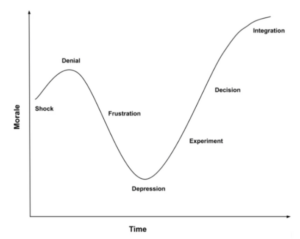
11 Apr Have You Prepared Your Team to Deal With Change?
Whether it’s part of your plan or it’s out of your control, change comes for every organization, and affects every team member.
At Talent Suite, we often work with companies who are experiencing challenges in the middle of a transition or change.
Sometimes, that change is a new piece of software or an organizational tool that will slightly change how your team operates. Sometimes, it’s as large and chaotic as the acquisition of a new company.
In both of these situations — to varying degrees — your employees will be forced to change and adapt, and it’s a leader’s job to consider how those changes will impact the team, as well as the methods they’ll use to make the process as smooth as possible. Too often, we see leaders foist change upon an unprepared team with an attitude of “This is the way it’s going to be. Deal with it.”
Sure, a new system or software may seem like a minor change, but it can disrupt the rhythm of some of your staff and introduce new problems, especially if implementation isn’t handled appropriately. The impact of a larger change like an acquisition may seem obvious, but there are elements that go unnoticed or unplanned for.
For instance, a merger can result in a manager becoming a director. Now, that person not only has to lead people they weren’t leading before, they’re now responsible for their performance, and may be tasked with improving or streamlining that performance. In this scenario, you’re not just asking this employee to understand how to deal with changes themselves, you’re asking them to understand how their direct reports are handling it, and help them maintain or improve performance along the way.
The differences that come with change aren’t just about the work itself, it’s about how your people are motivated to get that work done, and how willing or able they are to do it well.
This isn’t to say that change is inherently bad. It’s not! But if change comes and you’re unprepared, it can be a major negative to both individuals within your organization and the company itself. So while you can’t always control when that change comes, you can ensure that your team is ready for it.
You might know your staff well, talk to them often and have a sense of how they work, but without a baseline of objective knowledge and data, it’s virtually impossible to try to predict how they process and can be impacted by change.
How can you remedy this problem? It starts with data.
Behavioral analytics use science-based methodology to better measure a person’s motivating drives and needs in the workplace. There are several methods for gathering behavioral data, and at Talent Suite, we use the Predictive Index Behavioral Assessment, which can help you understand your team’s natural wiring and what they can do, as well as where they are being underutilized or overburdened.
With this baseline established, you won’t have to scramble to learn how your team will or is currently being affected by change — you’ll have the data in front of you to better understand which team members will be particularly impacted.
When preparing for change, it’s important to keep in mind that different people are experiencing the change in different ways. A good demonstration comes from the change curve:
This chart represents the way that people navigate change differently. It’s important to realize that not everyone goes through this path in the same way. Some start at frustration, while others may begin in experimentation. Without the backing of behavioral analytics on your side, you may not have any real idea where your team members are.
If you can understand how someone will respond to changes, it can make a huge impact on your ability to lead them through it. And understanding how people are naturally driven can help you understand where on the change curve people originate.
If you’re ready to be proactive and start considering the unique needs of your people, reach out. We’d love to help you reach your goals.

